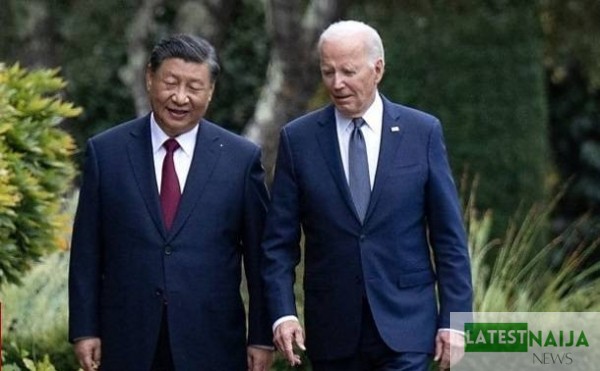In a bid to alleviate rising tensions, the United States and China have agreed to reestablish military-to-military communications, according to an announcement by President Joe Biden.

The breakthrough came after a rare face-to-face meeting between President Biden and China’s President, Xi Jinping, which took place in California and marked their first in-person conversation in over a year.
President Biden expressed optimism about the renewed communication channels, stating, “We’re back to direct, open, clear communications.” However, underlying tensions between the two nations remained evident, with President Biden reiterating his view that Xi Jinping operates as a dictator.
China’s foreign ministry later criticized Biden’s remarks, but the meeting, viewed as largely successful by both sides, seemed to remain on track.
In addition to the restoration of military communication, President Biden announced that both leaders had agreed to establish a direct line of communication with one another. The move is seen as an essential step in preventing misunderstandings and potential accidents.
The severed military-to-military communications between the two nations occurred last year when then-American House Speaker, Nancy Pelosi, visited Taiwan. China regards Taiwan as its territory and has not ruled out the use of force to reunify it with the mainland.
Despite their differences, President Biden praised President Xi for his straightforward approach during the discussions, characterizing them as some of the most constructive and productive dialogues to date.
In a subsequent dinner with U.S. business leaders, President Xi Jinping openly expressed his desire for improved relations with the United States. He emphasized their commitment to diplomacy and cooperation, stating, “The door of China-U.S. relations cannot be closed again now that it’s open. We need to build more bridges and pave more roads between each other.”
However, signs of lingering difficulties in the relationship surfaced when President Biden, during a question-and-answer session with reporters, referred to Xi Jinping as a dictator. This statement mirrored similar comments he made in June, which had elicited an angry response from Chinese officials, deeming it absurd and irresponsible.
China’s foreign ministry swiftly condemned Biden’s recent remark, labeling it “extremely wrong and irresponsible political manipulation.” Despite this discord, it did not overshadow the generally positive nature of the meeting, as it was conspicuously omitted from China’s state news agency Xinhua’s account of the event.
The meeting yielded several agreements in areas that have recently strained bilateral relations. Notably, both nations committed to taking measures to address the influx of fentanyl into the United States, a synthetic opioid contributing to a surge in overdose deaths.
Chinese manufacturing companies have been identified as sources not only of the synthetic opioid itself but also of precursor chemicals used in its production. President Biden stated, “We’re taking action to significantly reduce the flow of precursor chemicals and pill presses from China to the Western Hemisphere.”
Under the agreement, China will target companies directly involved in producing these precursor chemicals, with the goal of saving lives and curbing the opioid crisis in the United States. The move signifies a significant step forward in addressing this pressing issue in bilateral relations between the two nations.

Submit press release, news tips to us: tips@odunews.com | Follow us @ODUNewsNG
